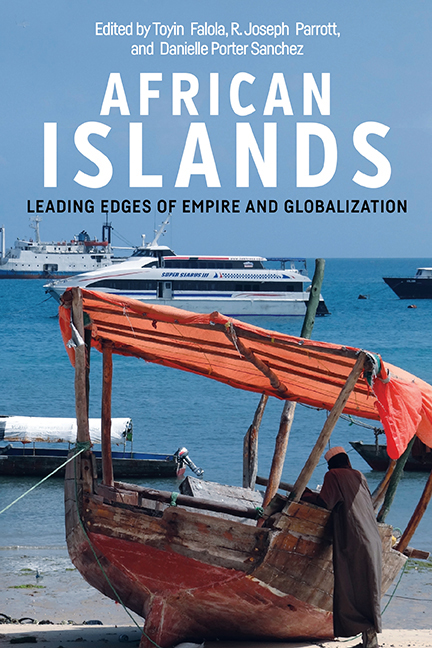Book contents
- Frontmatter
- Dedication
- Contents
- Introduction: Arbiters and Witnesses of Change: Contextualizing Conversations on African Islands
- Part 1 Atlantic Ocean Islands
- 1 The Canaries to Africa: The Atlantic Strategy of “To Be or Not to Be”
- 2 Sugar, Cocoa, and Oil: Economic Success and Failure in São Tomé and Príncipe from the Sixteenth to the Twenty-First Centuries
- 3 The Bijagos of Canhabac Island (Guinea-Bissau)
- 4 An Island in the Middle of Everywhere: Bioko under Colonial Domination
- 5 Cursing in Bioko and Annobón: Repeating Islands that Don't Repeat
- 6 African Ports and Islands during the Second World War
- 7 “Nos lingua, nos kultura, nos identidadi”: Postcolonial Language Planning and Promotion in Cabo Verde and the Cape Verdean Diaspora
- Part 2 Indian Ocean Islands
- Notes on Contributors
- Index
4 - An Island in the Middle of Everywhere: Bioko under Colonial Domination
from Part 1 - Atlantic Ocean Islands
Published online by Cambridge University Press: 31 August 2019
- Frontmatter
- Dedication
- Contents
- Introduction: Arbiters and Witnesses of Change: Contextualizing Conversations on African Islands
- Part 1 Atlantic Ocean Islands
- 1 The Canaries to Africa: The Atlantic Strategy of “To Be or Not to Be”
- 2 Sugar, Cocoa, and Oil: Economic Success and Failure in São Tomé and Príncipe from the Sixteenth to the Twenty-First Centuries
- 3 The Bijagos of Canhabac Island (Guinea-Bissau)
- 4 An Island in the Middle of Everywhere: Bioko under Colonial Domination
- 5 Cursing in Bioko and Annobón: Repeating Islands that Don't Repeat
- 6 African Ports and Islands during the Second World War
- 7 “Nos lingua, nos kultura, nos identidadi”: Postcolonial Language Planning and Promotion in Cabo Verde and the Cape Verdean Diaspora
- Part 2 Indian Ocean Islands
- Notes on Contributors
- Index
Summary
Before 1967 it is difficult to tell how the Bubi felt about the ties that linked their native island of Bioko—Fernando Po at the time—to continental Equatorial Guinea, Rio Muni. For most of the Spanish colonial era (1858–1968), the inhabitants of Bioko had lived with their backs to Rio Muni. Even though the Spanish claimed historical rights over nearly 77,220 square miles of the mainland territory on the basis of the 1777 Treaty of San Ildefonso-El Pardo between Portugal and Spain, European colonial powers refused to acknowledge such rights. Not until 1883 did Spain timidly begin to make effective its presence on a very small portion of the mainland— the Muni Estuary area—and, especially the nearby small islands of Corisco and Elobey Chico. In 1900, after the signing of the Franc o-Spanish Treaty of Paris, Spanish rights over what became known as Rio Muni were eventually recognized and integrated into a single colony with the rest of Spanish possessions in the Spanish Territories of the Gulf of Guinea. The treaty, however, dampened Spanish colonial ambitions south of the Sahara, for Spain was awarded only 10,038 square miles of a territory relatively distant from Bioko. Following such a disappointment, Bioko remained the center of political authority during the entire period of Spanish colonial domination as well as the main focus of economic investment and development. Rio Muni was, to a large extent, an appendage, especially after the late 1920s, when it became clear that it could not provide the much-needed labor force for the thriving cocoa plantations of Bioko. In many ways, Bioko had been both island and mainland with Rio Muni largely depending on the political decisions and economic handouts delivered from Bioko. By the mid-1960s, however, the situation was about to change. Negotiations leading to independence designed a future in which the two territories, Bioko and Rio Muni, would become part of a single sovereign nation, Equatorial Guinea. The reaction from segments of the Bubi population was quick and, with the help of Spanish settlers, they founded Unión Bubi (UB), the political organization that would represent the interests of Bioko's indigenous people and which was granted a seat at the Constitutional Conference (1967–68).
- Type
- Chapter
- Information
- African IslandsLeading Edges of Empire and Globalization, pp. 125 - 156Publisher: Boydell & BrewerPrint publication year: 2019



